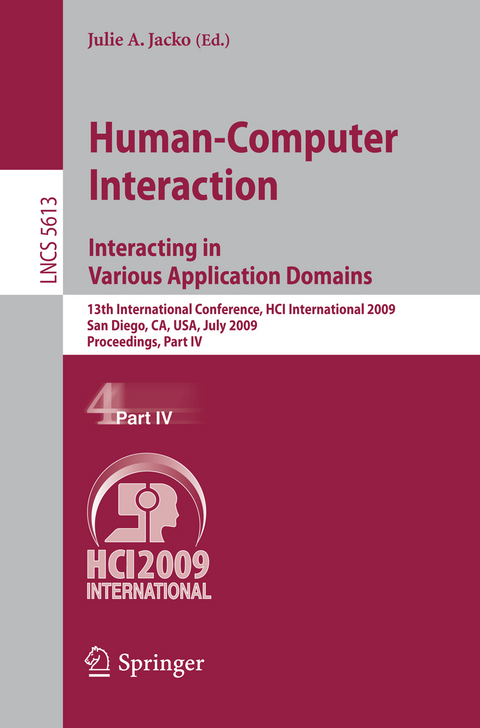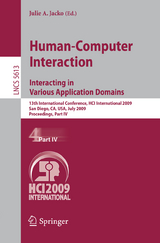Human-Computer Interaction. Interacting in Various Application Domains
Springer Berlin (Verlag)
978-3-642-02582-2 (ISBN)
eLearning and Education.- Arab Children's Reading Preference for Different Online Fonts.- Adaptation Decisions and Profiles Exchange among Open Learning Management Systems Based on Agent Negotiations and Machine Learning Techniques.- Accessing e-Learning Systems via Screen Reader: An Example.- Using Tablet PCs and Pen-Based Technologies to Support Engineering Education.- Optimal Affective Conditions for Subconscious Learning in a 3D Intelligent Tutoring System.- Computer-Based Learning to Improve Breast Cancer Detection Skills.- Virtual Classroom and Communicability: Empathy and Interaction for All.- Communicability for Virtual Learning: Evaluation.- Attention and Motivation in Hypermedia Systems.- A Web-Based, Interactive Annotation Editor for the eCampus Development Environment for SCORM Compliant E-Learning Modules.- An Innovative Way of Understanding Learning Processes: Eye Tracking.- A Set of Rules and Strategies for UNSAM Virtual Campus.- HCI Professional Involvement in k-12 Education: On Target or Missing the Mark?.- A Language Learning System Utilizing RFID Technology for Total Physical Response Activities.- Promoting Metacognition in Immersive Cultural Learning Environments.- The Application of the Flexilevel Approach for the Assessment of Computer Science Undergraduates.- Development of Ubiquitous On-Demand Study Support Environment for Nursing Students.- The Effects of Prior Knowledge on the Use of Adaptive Hypermedia Learning Systems.- Supporting Learners in Adaptive Learning Environments through the Enhancement of the Student Model.- The Concept of IMPRESSION: An Interactive Instruction System and Its Practice for Real-Time Distance Lessons between U.S. and Japan.- Improving Children's Writing Ability.- From Paper to Module - An Integrated Environment for Generating SCORM Compliant Moodle Courses Out of Text and Multimedia Elements.- Development of a Simulator of Abacus: Ancient Analog Calculator on a Mobile Phone as a Teaching Material.- A Proposal for a Framework for an e-Alumni Program Using SNS.- Supporting End-User Development of Personalized Mobile Learning Tools.- Didactic Models as Design Representations.- Interactive Learning Panels.- WebELS: A Content-Centered E-Learning Platform for Postgraduate Education in Engineering.- A Pen-Based Teaching System for Children and Its Usability Evaluation.- Development of a Visualised Sound Simulation Environment: An e-Approach to a Constructivist Way of Learning.- Games and Entertainment.- Causal Links of Presence.- Games Design Principles for Improving Social Web Applications.- A Multiple-Level 3D-LEGO Game in Augmented Reality for Improving Spatial Ability.- An Online Survey System on Computer Game Enjoyment and Personality.- Playability Testing of Web-Based Sport Games with Older Children and Teenagers.- Exploring the Elements and Design Criteria of Massively-Multiplayer Online Role-Playing Game (MMORPG) Interfaces.- Healthcare Game Design: Behavioral Modeling of Serious Gaming Design for Children with Chronic Diseases.- Analyzing Human Behaviors in an Interactive Art Installation.- The Effects of Quest Types and Gaming Motivations on Players' Knowledge Acquisitions in an Online Role-Playing Game Environment.- Self-movement Feeling Generation in Sports Watching with Screen Movement via Pan-Tilt Steerable Projector.- Design of Interactive Emotional Sound Edutainment System.- Understanding Online Game Addiction: Connection between Presence and Flow.- The Experience of Presence in 3D Web Environment: An Analysis of Korean Second Life.- Influence of Real-World Ten-Pin Bowling Experience on Performance during First-Time Nintendo Wii Bowling Practice.- Emotionally Adapted Games - An Example of a First Person Shooter.- DiamondTheater: A System for Reproducing Theater and Supporting Creative Activities.- Work, Collaboration and Business.- New Health Information Systems (HIS) Quality-in-Use Model Based on the GQM Approach and HCI Principles.- An Information
| Erscheint lt. Verlag | 1.7.2009 |
|---|---|
| Reihe/Serie | Information Systems and Applications, incl. Internet/Web, and HCI | Lecture Notes in Computer Science |
| Zusatzinfo | XXI, 781 p. |
| Verlagsort | Berlin |
| Sprache | englisch |
| Maße | 155 x 235 mm |
| Themenwelt | Mathematik / Informatik ► Informatik ► Betriebssysteme / Server |
| Informatik ► Software Entwicklung ► User Interfaces (HCI) | |
| Schlagworte | augmented cognition • augmentet reality • Design • E-Collaboration • E-Commerce • E-Learning • end-user development • Hardcover, Softcover / Informatik, EDV/Betriebssysteme, Benutzeroberflächen • HCI • Human-Computer Interaction (HCI) • Immersion • Information Visualization • Interaction Design • mixed reality • Social Computing • ubiquitous computing • Universal Access • Usability • User Interfaces • Virtual Reality |
| ISBN-10 | 3-642-02582-X / 364202582X |
| ISBN-13 | 978-3-642-02582-2 / 9783642025822 |
| Zustand | Neuware |
| Haben Sie eine Frage zum Produkt? |
aus dem Bereich




